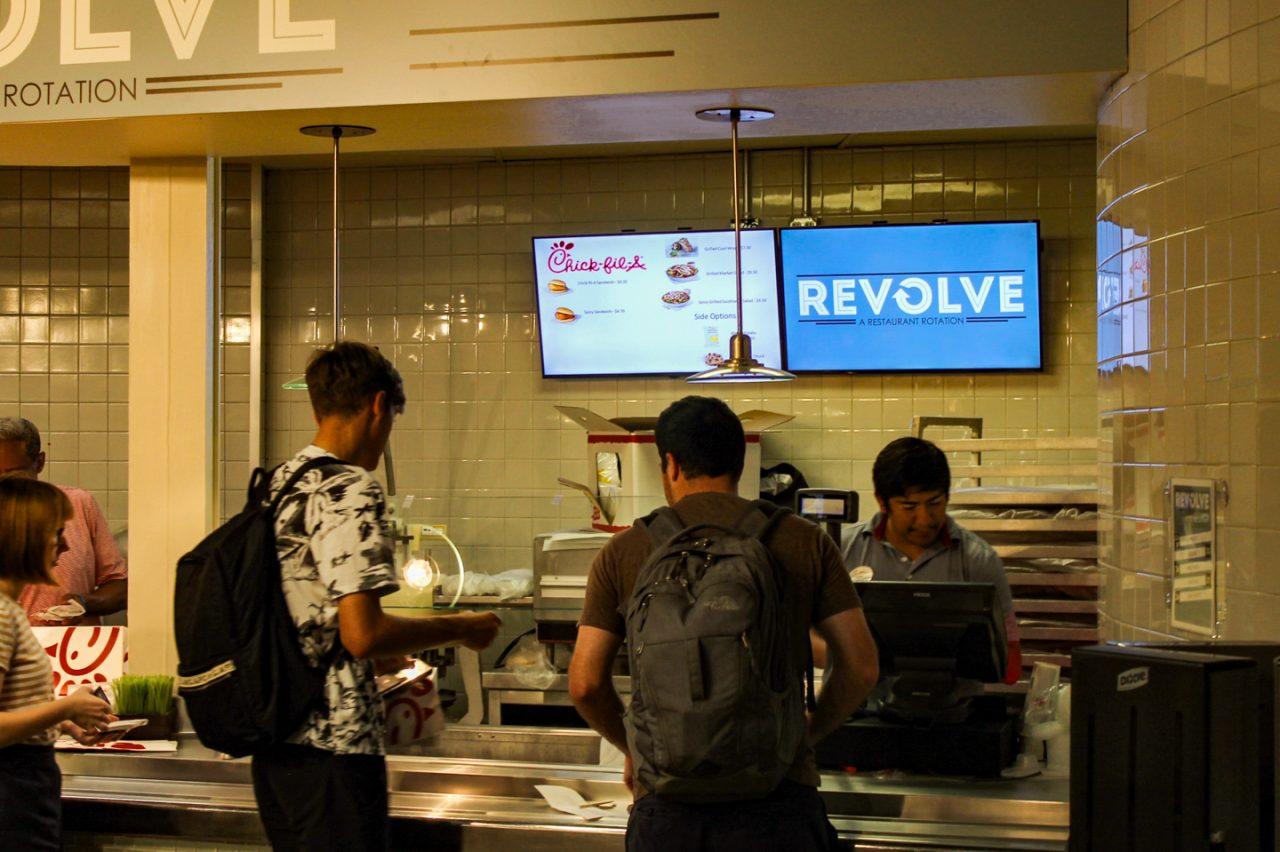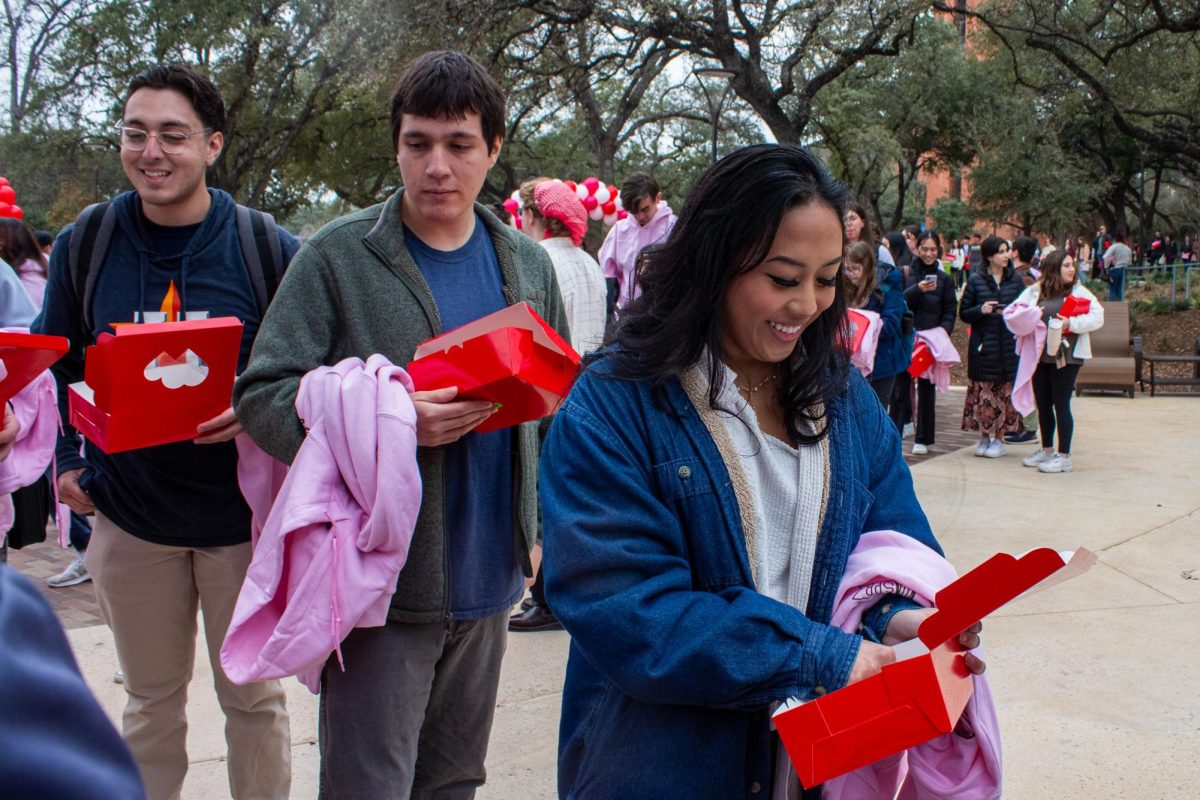Photo by Oliver Chapin-Eiserloh
Chick-fil-A was first brought to campus during Aug. 2018, after many students recommended it in the Food Services Survey conducted in Spring 2018. After almost a full school year of little to no opposition, the Chick-fil-A option in Revolve was met with backlash during Spring 2019. Some Trinity students began to show distaste and avoidance of the dining option while others were happy to eat more chicken. Eventually, discussion began in the Student Government Association (SGA) and among the school of whether or not to keep Chick-fil-A on campus.
A forum was held on April 17 where people from all facets of the Trinity community discussed Chick-fil-A’s presence on campus, and two weeks later, SGA passed a resolution at their meeting on May 1 that recommended Chick-fil-A be removed.
However, the Trinity administration had the final say, and on May 10, Tess Coody-Anders, vice president for Strategic Communications and Marketing, sent out a Trinity-wide email that stated their decision was to keep Chick-fil-A in Revolve.
According to Coody-Anders, the decision was made based on the belief that the majority of Trinity students wanted to keep Chick-fil-A in Revolve. This was determined based on business metrics — in this case using sales and the Food Service Survey as an indicator of student interest.
“There’s a contractual relationship between Aramark and Trinity, and there are performance metrics that are included in that contract. Requests for changes to those services get evaluated through those performance indicators, and a recommendation is made to the executive leadership team. The decision seemed to be purely based on the business metrics and using those as an indicator of majority preference,” Coody-Anders said.
The executive leadership team is made up of the president, Danny Anderson, and the president’s cabinet, which includes all of the vice presidents and legal counsel.
“That group solicits input and recommendations from any division involved in such a decision. But, ultimately, it’s that group’s call. Various members may have different personal opinions about what to do and how, but the decision is made as a group,” Coody-Anders said.
The Food Services Survey in Spring 2019 was open from April 22 to May 10, just after the forum was held and extended after SGA’s resolution. The results were mainly positive.
“Students, staff and faculty were surveyed on overall satisfaction with service, food selection and quality, responsiveness of staff, etc. Ninety percent said they were completely satisfied with the overall experience, and their lowest score was in the category of satisfaction with new menu items monthly — only 35 percent said they were satisfied,” Paul Wright, director of business operations, wrote in an email interview.
Chick-fil-A only came to Revolve one time between SGA’s resolution and the end of the school year. Their sales figures remained fairly consistent.
“We normally don’t reveal sales figures, but the last day they were here, after the survey, was $3,000. That was also around reading days, so the sales were strong for that time period. Typical [Chick-fil-A] sales on normal days are around $4,500,” Wright wrote.
Both Wright and Coody-Anders believe it’s possible that Chick-fil-A might have been removed if sales had dropped significantly.
“If students organize an effort to say, ‘you shouldn’t spend your money at Chick-fil-A,’ and it’s effective, I think you probably would see a change sooner than later because we’ve established that this is about a majority preference,” Coody-Anders said. “I think that there would be a certain point where whether the University asked them to leave or not if it was not financially viable, they would definitely leave.”
Students were disappointed in the decision, believing that the Trinity administration had made a choice against the LGBTQ+ community. The PRIDE Officer Team issued the following statement to the Trinitonian:
“Ultimately, this decision comes down to the administration. Try as we might, administration holds the power, and they have clearly demonstrated to us that this issue isn’t worth investing any more energy into. Since they have decided to keep Aramark on, it again only further signals a lack of want to listen to the minority students which this decision affects. On top of these issues, Trinity already has recent and older history that consistently highlights a disservice to the campus’ LGBTQIA+ community. Since this is an event that occurred the previous academic year, PRIDE is looking forward to moving on from the unrest that this situation created; we are looking to collectively focus on the healing process and grow from the incident.”
Coody-Anders understands where the hurt is coming from and believes that this conversation is not over yet. She urges students to keep the conversation going.
“I hope we’ll acknowledge that maybe last spring’s process was faulty and flawed for all of us and that we have a new year and a new opportunity to talk about what this means, particularly in the context of our value of intentional inclusion,” Coody-Anders said. “Even if the decision has been made for a year, there’s no reason just to let it lie fallow and then revisit it in a year. We can talk, we can converse. I think there’s an opportunity to educate and persuade people.”
Tyler Tinker, president of SGA, hopes to reach out to Trinity’s community for next steps.
“We really want to do what’s right by the communities impacted by this, so whether it is to reinvigorate the discussion on Chick-fil-A or if it is to hopefully help out with this new gender-inclusive hall. We’re not positive, and we really need student feedback to address those issues,” Tinker said.













